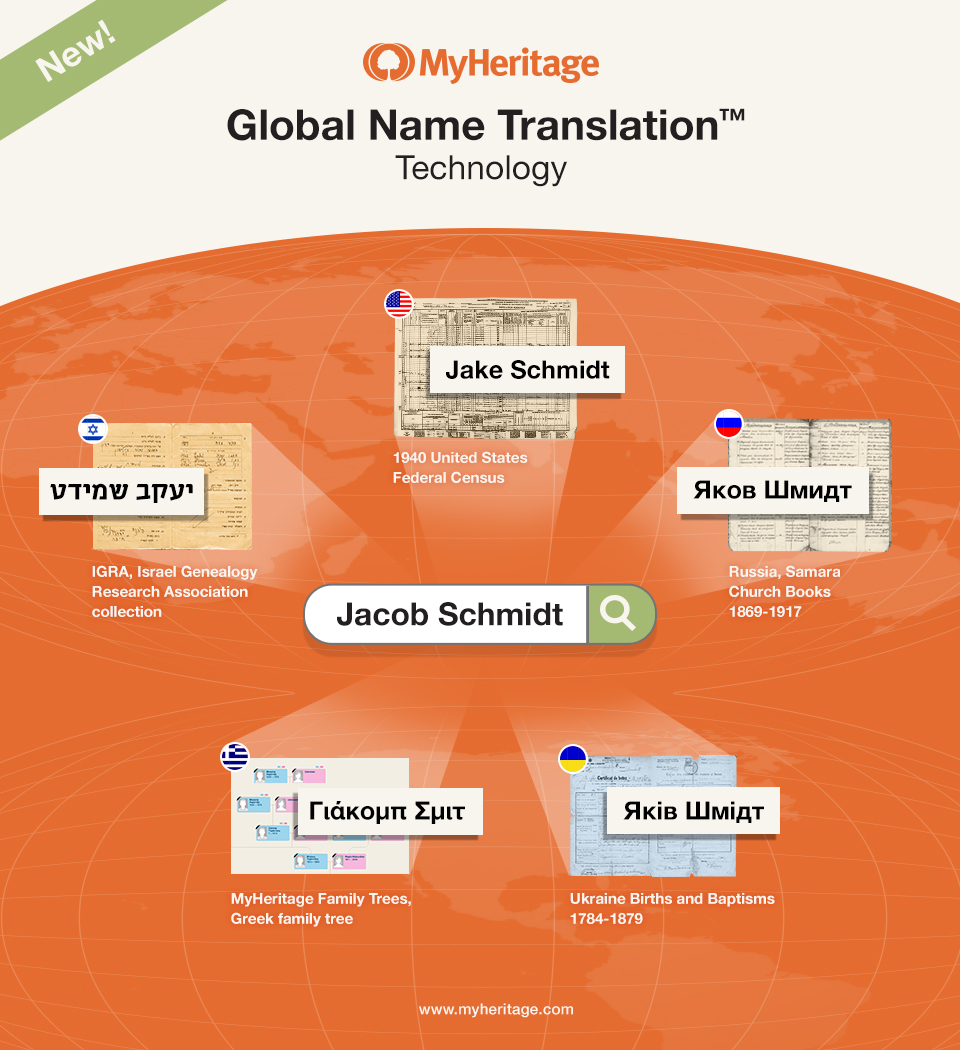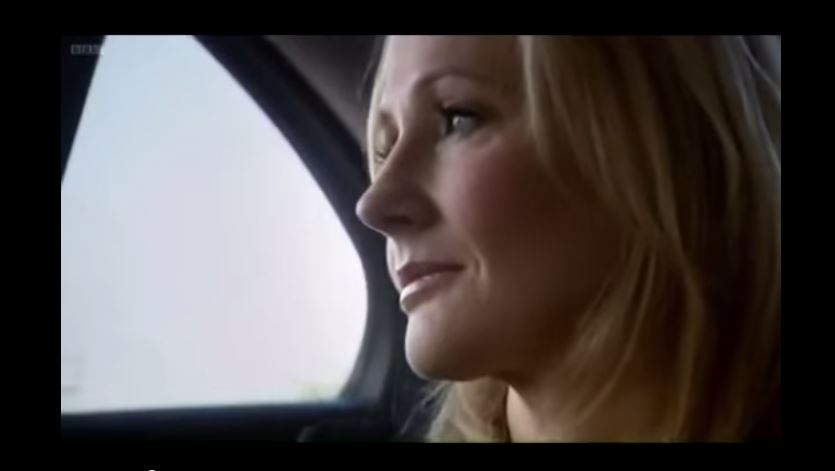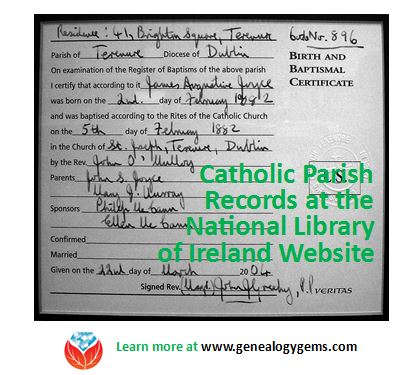Blog


Language Translation Tool for Genealogy: MyHeritage’s New Global Name Translation
 At some point in the past, many of our relatives–overseas or in the same land–spoke a different language. They used different versions of names we know. Records about their lives were created in a language we don’t know, whether their home tongue or the language of an institution, like church records in Latin.
At some point in the past, many of our relatives–overseas or in the same land–spoke a different language. They used different versions of names we know. Records about their lives were created in a language we don’t know, whether their home tongue or the language of an institution, like church records in Latin.
Well, MyHeritage has just launched a groundbreaking new technology today that aims to remove language barriers in family history research. “Global Name Translation™ helps overcome the Tower of Babel syndrome,” says Gilad Japhet, Founder and CEO of MyHeritage. “The world is getting smaller and more connected, yet information from other countries is still mostly hidden from those who don’t speak the language.
Now you can now search for historical records at MyHeritage “in one language and receive relevant results from other languages, automatically translated for you into the language of your search,” explains Japhet.  For example? “A search for Alessandro (Alexander in Italian) will also find ‘Саша’ (which is the Russian form of Sasha, a popular nickname of Alexander in Russia) with its corresponding transliteration into the language of your search.”
For example? “A search for Alessandro (Alexander in Italian) will also find ‘Саша’ (which is the Russian form of Sasha, a popular nickname of Alexander in Russia) with its corresponding transliteration into the language of your search.”
This technology is also integrated into MyHeritage matching technologies, so subscribers will begin receiving transliterated matches from other languages.
According to a press release, Global Name Translation™ works with “very high accuracy, generating all the plausible translations, to facilitate matches between names in different languages. In addition, a manual search in one language will also provide results in other languages, translated back to the user’s language for convenience. This is a unique innovation not offered elsewhere, useful for anyone interested in discovering their global roots.”
The first version works with several languages: English, German, Dutch, French, Spanish, Catalan, Portuguese, Italian, Norwegian, Swedish, Danish, Greek, Hebrew, Polish, Czech, Russian and Ukrainian. “The next version currently in development will add Chinese and Japanese, and additional languages will follow.”
 Click here to learn more reasons we love MyHeritage, which is a sponsor of the free Genealogy Gems podcast, or click here to explore MyHeritage yourself. If you are looking for a language translation tool for genealogy outside of MyHeritage, check out the chapter on Google Translate in the fully-revised and updated second edition of The Genealogist’s Google Toolbox by Lisa Louise Cooke.
Click here to learn more reasons we love MyHeritage, which is a sponsor of the free Genealogy Gems podcast, or click here to explore MyHeritage yourself. If you are looking for a language translation tool for genealogy outside of MyHeritage, check out the chapter on Google Translate in the fully-revised and updated second edition of The Genealogist’s Google Toolbox by Lisa Louise Cooke.

WDYTYA 2015: Summer Episodes Begin July 26
 On Sunday, July 26, 2015 at 9pm EST, Who Do You Think You Are? (WDYTYA 2015) returns to TLC in the United States for more great episodes:
On Sunday, July 26, 2015 at 9pm EST, Who Do You Think You Are? (WDYTYA 2015) returns to TLC in the United States for more great episodes:
- TLC will air the U.S. premiere of J.K. Rowling’s episode, where the best-selling author sets off to uncover her maternal French roots. She finds that a family war story might not be what she thought when military records reveal a surprising twist.
- Tom Bergeron, who is aware of his French Canadian roots on his paternal side, but wants to know what brought his ancestors to North America. He goes as far back as his 10x great grandmother to find the answer.
- Bryan Cranston, who comes to discover an unfortunate pattern amongst the men in his family.
- Ginnifer Goodwin, who sets out to learn about her mysterious paternal great grandparents, whom her father, regretfully, does not know much about either.
- Alfre Woodard, who strives to find out more about the paternal side of her family, and explores how her surname came to be.
While you’re waiting for Who Do You Think You Are Summer 2015 to kick off, enjoy this unseen footage from the J.K. Rowling episode on the old WhoDoYouThinkYouAre website and these fun interviews with genealogy television industry leaders:
- A FREE Genealogy Gems podcast interview with Henry Louis Gates, host of the popular PBS show Finding Your Roots with Henry Louis Gates, Jr;
- FREE access to the Genealogy Gems Premium podcast interview with Dan Bucatinsky, Executive Producer of Who Do You Think You Are?
- FREE Genealogy Gems podcast interview with Lisa Kudrow and Vanessa Williams, talking about Who Do You Think You Are?
- Below, catch my video interview with Mary Tedesco, co-host of PBS’ Genealogy Roadshow.

Irish Catholic Parish Registers from National Library of Ireland
As of today, the National Library of Ireland expects to launch a free, digitized collection of ALL its Catholic parish registers on its website (this link takes you to the English version; it’s also available in Irish). Nearly 400,000 digital images of microfilmed parish records comprise this collection.
According to a press release, “The parish register records are considered the single most important source of information on Irish family history prior to the 1901 Census. Dating from the 1740s to the 1880s, they cover 1,091 parishes throughout the island of Ireland, and consist primarily of baptismal and marriage records….Their digitisation means that, for the first time, anyone who likes will be able to access these registers without having to travel to Dublin.”
Catholic parish registers are a vital genealogical resource. In addition to the names of those baptized or married, they usually include those event dates, names of parents of baptized children, godparents and witnesses (who may also be relatives).
NOTE: This is a browsable-only collection. There are currently no plans to index or transcribe the records. However, the press release included a great suggestion for accessing indexes: look to local family history centers for that parish or neighborhood. “The buy diet medication online nationwide network of local family history centres holds indexes and transcripts of parish registers for their local areas,” it says.
 Those unfamiliar with Ireland research may assume this means local FamilySearch Family History Centers, but a map shows only a few of these in Ireland. I would start first with the network of county genealogy centers, accessible online at Roots Ireland. According to that site, “The county genealogy centres are based in local communities, working with volunteers, local historical societies, local clergy, local authorities, county libraries and government agencies to build a database of genealogical records for their county. By using this website you are supporting that work and the communities from which your ancestors originated.” Several counties actually already have online records you can access through the Roots Ireland link above. Ancestry also has several databases of Irish Catholic parish registers.
Those unfamiliar with Ireland research may assume this means local FamilySearch Family History Centers, but a map shows only a few of these in Ireland. I would start first with the network of county genealogy centers, accessible online at Roots Ireland. According to that site, “The county genealogy centres are based in local communities, working with volunteers, local historical societies, local clergy, local authorities, county libraries and government agencies to build a database of genealogical records for their county. By using this website you are supporting that work and the communities from which your ancestors originated.” Several counties actually already have online records you can access through the Roots Ireland link above. Ancestry also has several databases of Irish Catholic parish registers.
For more tips on researching your Irish relatives, listen to the FREE Family History Made Easy podcast episode 21, in which we interviewed Irish expert Judith Wight. You’ll hear her tips on finding Church of Ireland records, civil registrations, estate records and how history helps us understand gaps in the records.
Thank you for sharing this post with those who will LOVE to know about these Irish genealogy resources!




